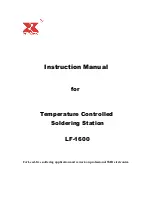
25
9. Desoldering
• If the component you wish to desolder is defective (for example, a large IC), you can point the nozzle directly
at the component and not at the pins. Especially in the case of components with connection pins on each side,
desoldering may be practically impossible.
• When desoldering, always make sure that the conductor paths are not heated up, otherwise they may detach from
the carrier material.
• Please remove the IC with pincers or tweezers as soon as the soldering tin is melted.
• After you have removed the component, you can remove the remaining soldering tin with a desoldering suction
pump (not included).
10. Use as a hot air blower
• The hot air nozzle can also be used for heating suitable objects, for example, for shrinking shrink tubes.
• Depending on the size of the object, the hot air nozzle can be operated with or without the nozzle. Make sure when
heating that no surrounding components/objects can be damaged.
In the case of improper handling or heating of unsuitable objects, there is danger of fire / explosion!
Never point the hot air jet toward your body, risk of burns/injury!
Heating objects may cause toxic and harmful gases to form. Therefore, always ensure sufficient ventilation.
11. Changing the soldering tip
Use a suitable soldering tip depending on the soldering job at hand.
You can find suitable accessories on the product related website at www.conrad.com. Enter the order
number into the search bar.
Only use soldering tips that are recommended for use with the soldering station.
The use of other soldering tips can lead to a false temperature reading (the actual temperature of the
soldering tip does not match the temperature display). In addition, the heating element can be damaged.
This leads to a loss of the warranty.
When working on small components, use a very fine soldering tip. However, when soldering on larger components,
a soldering tip with a broader/flat tip should be used. A larger soldering tip can transfer more heat so the soldering
process goes more quickly.





































